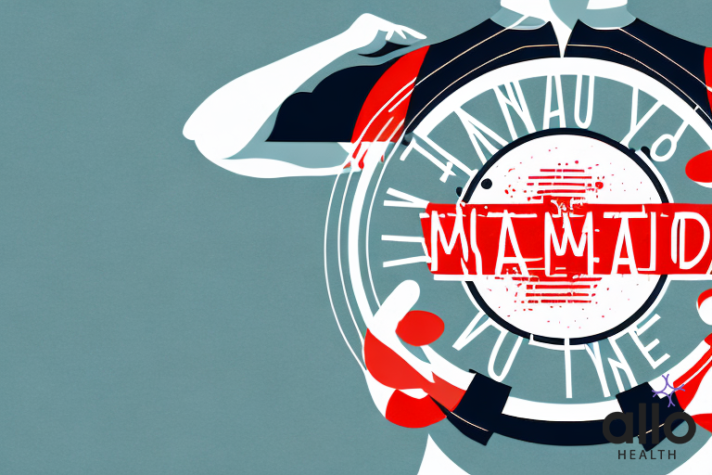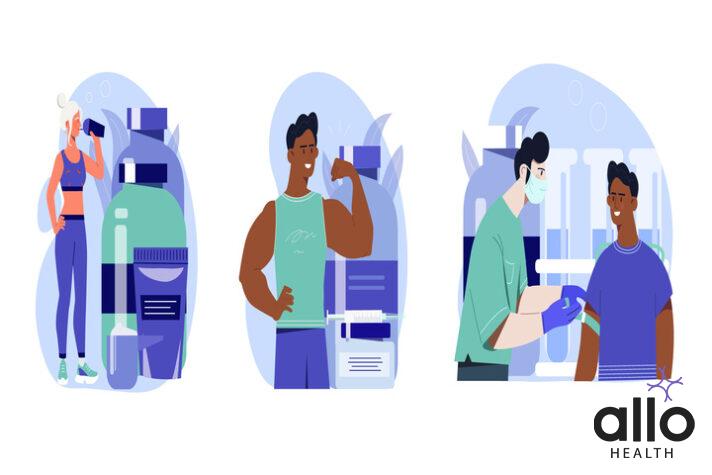How To Avoid Erectile Dysfunction On Steroids?

Allo Health is dedicated to personalized well-being, offering support and trusted information tailored to individual health goals. The platform emphasizes human-generated content, led by a distinguished medical team of experts, including physicians and sexual health specialists. Their commitment to credibility involves rigorous fact-checking, authoritative research, and continuous updates to ensure accurate, up-to-date information. Allo Health's unique approach goes beyond conventional platforms, providing expert-led insights and a continuous commitment to excellence, with user feedback playing a crucial role in shaping the platform's authoritative voice.

Dr. Raj. R holds an undergraduate medical degree from the Philippines, and has a bachelors background in Psychology. His experience working in the field of urology further brought his interest forward in working towards his passion of understanding the science of attraction, intimacy, sex and relationships. A key motto he practices by remains unprejudiced and non-judgemental care.
Why This Was Upated?
Our experts continually monitor the health and wellness space, and we update our articles when new information became available.
Updated on 15 April, 2024
- Article was updated as part of our commitment to diversity, equity, and inclusion.

"The following blog article provides general information and insights on various topics. However, it is important to note that the information presented is not intended as professional advice in any specific field or area. The content of this blog is for general educational and informational purposes only.
Book consultation
The content should not be interpreted as endorsement, recommendation, or guarantee of any product, service, or information mentioned. Readers are solely responsible for the decisions and actions they take based on the information provided in this blog. It is essential to exercise individual judgment, critical thinking, and personal responsibility when applying or implementing any information or suggestions discussed in the blog."
If you’re considering using steroids to gain muscle mass, it’s important to be aware of the potential side effects, including the risk of erectile dysfunction (ED). While the relationship between steroids and ED is complex, there are steps you can take to minimize the risk of experiencing this unpleasant side effect.
What Are Steroids?
Steroids, in a broad sense, are a class of organic compounds characterized by a specific arrangement of four cycloalkane rings joined together. They serve various functions in living organisms, including animals, plants, and fungi. However, when people commonly refer to steroids, they are usually talking about a specific subgroup known as anabolic steroids, which are synthetic variations of the male sex hormone testosterone.
Here are the key points about steroids:
- Chemical Structure: Steroids have a core structure consisting of four fused carbon rings (three six-membered rings and one five-membered ring). This structure is often depicted as a hexagonal ring system.
- Biological Functions: In living organisms, steroids play crucial roles. For example, cholesterol is a steroid that is a vital component of cell membranes and serves as a precursor for the synthesis of various hormones.
- Anabolic Steroids:
- Anabolic steroids are synthetic substances related to male sex hormones, particularly testosterone. They have both anabolic (muscle-building) and androgenic (masculinizing) effects.
- These steroids were initially developed to treat conditions like delayed puberty, muscle wasting diseases, and osteoporosis.
- Medical Uses:
- In a medical context, steroids are prescribed for various conditions, including inflammatory disorders like rheumatoid arthritis, asthma, and certain skin conditions.
- Corticosteroids are a type of steroids used to reduce inflammation and suppress the immune system.
- Abuse and Performance Enhancement:
- Outside of medical applications, anabolic steroids are sometimes misused by athletes and bodybuilders to enhance performance or improve physical appearance.
- Such misuse can lead to serious health risks and side effects, including liver damage, cardiovascular concerns, hormonal imbalances, and psychological effects.
- Forms of Administration:
- Anabolic steroids can be taken orally or injected. The method of administration can affect the drug’s metabolism and how it interacts with the body.
- Side Effects:
- Prolonged use or misuse of anabolic steroids can lead to a range of side effects, including but not limited to:
- Liver damage
- Cardiovascular concerns
- Hormonal imbalances
- Psychiatric effects such as mood swings and aggression
- Reproductive system changes, including infertility
- Prolonged use or misuse of anabolic steroids can lead to a range of side effects, including but not limited to:
It is crucial to note that the use of anabolic steroids without proper medical supervision can be dangerous and is often illegal. Before considering any steroid use, individuals should consult with healthcare professionals to understand the potential risks and benefits associated with these substances.
How To Steroids Affect Each Body System?
Anabolic steroids, when misused or abused, can have profound effects on various body systems. It’s important to note that the misuse of steroids can lead to serious health consequences. Here’s a breakdown of how steroids can affect different body systems:
- Endocrine System: Anabolic steroids are synthetic versions of the male sex hormone testosterone. When introduced into the body, they can disrupt the normal hormonal balance. This can lead to the body’s feedback mechanisms shutting down natural testosterone production, which may result in testicular atrophy and infertility.
- Reproductive System:
- In males, anabolic steroids can cause testicular atrophy, reduced sperm count, and infertility. There may also be an increased risk of developing prostate concerns.
- In females, steroids can lead to irregular menstrual cycles, masculinization (development of male characteristics), and infertility.
- Cardiovascular System:
- Steroid abuse has been associated with cardiovascular concerns, including an increased risk of heart attacks and strokes. Steroids can adversely affect blood lipid profiles by lowering HDL (good cholesterol) and increasing LDL (bad cholesterol).
- Elevated blood pressure is another common side effect, which can contribute to long-term cardiovascular concerns.
- Liver: Oral anabolic steroids can be hepatotoxic (toxic to the liver). Prolonged use or high doses may lead to liver damage, including conditions like hepatic tumors and cholestatic hepatitis.
- Musculoskeletal System:
- Anabolic steroids are known for their muscle-building (anabolic) effects. However, this can be associated with muscle dysmorphia and excessive, unnatural muscle growth.
- The use of steroids does not necessarily lead to increased strength and performance in a way that is proportional to muscle size, and it can also increase the risk of tendon injuries.
- Psychiatric and Behavioral Effects: Steroid use has been linked to various psychiatric effects, including mood swings, irritability, aggression (commonly referred to as “roid rage”), and increased risk of psychiatric disorders such as depression and anxiety.
- Immune System: Prolonged steroid use can suppress the immune system, making individuals more susceptible to infections and illnesses.
- Skin: Steroid use can lead to skin concerns, including acne and oily skin. In some cases, individuals may experience severe acne, cysts, and abscess formation.
- Fluid and Electrolyte Balance: Steroids can lead to fluid retention and electrolyte imbalances, potentially resulting in conditions like edema (swelling) and hypertension.
- Central Nervous System: Steroid use may affect mood and behavior, leading to symptoms like irritability, aggression, and mood swings. Additionally, it may contribute to dependence and withdrawal symptoms upon discontinuation.
It’s essential to emphasize that the misuse of anabolic steroids is associated with significant health risks, and individuals should not use these substances without proper medical supervision. Seeking advice from healthcare professionals before considering any steroid use is crucial to understanding the potential risks and benefits and minimizing the likelihood of adverse effects.
Can Steroids Cause Erectile Dysfunction?
Yes, the use of anabolic steroids can potentially contribute to erectile dysfunction (ED) and other sexual health concerns. Here’s how steroids may impact the mechanisms related to erectile function:
- Hormonal Imbalance: Anabolic steroids, which are synthetic versions of testosterone, can disrupt the normal hormonal balance in the body. When exogenous (externally introduced) testosterone is introduced, the body’s natural production of the hormone may decrease. This can lead to a hormonal imbalance, and low levels of testosterone are associated with sexual dysfunction, including erectile dysfunction.
- Testicular Atrophy: Prolonged use of anabolic steroids can lead to testicular atrophy, where the testicles shrink in size. This occurs because the body senses the presence of exogenous testosterone and signals the testes to reduce natural production. Smaller testes may produce lower levels of testosterone, contributing to sexual dysfunction.
- Suppression of Natural Hormone Production: Steroids can suppress the production of gonadotropins, which are hormones that stimulate the testes to produce testosterone. This suppression can lead to a decrease in endogenous testosterone levels, potentially causing sexual dysfunction.
- Psychological Effects: Steroid use is associated with various psychological effects, including mood swings, irritability, and aggression. These mood disturbances may affect sexual desire and performance, contributing to erectile dysfunction.
- Blood Flow and Cardiovascular Effects: Steroid abuse is linked to cardiovascular concerns, including alterations in lipid profiles and increased risk of atherosclerosis (hardening of the arteries). These cardiovascular changes can impact blood flow, which is crucial for achieving and maintaining an erection.
- Prostate Enlargement: Anabolic steroids may contribute to the enlargement of the prostate, a condition known as benign prostatic hyperplasia (BPH). Prostate enlargement can lead to urinary and sexual concerns, including erectile dysfunction.
It’s important to note that the impact of steroids on sexual function can vary among individuals, and not everyone who uses steroids will experience erectile dysfunction. However, the risk increases with the duration and intensity of steroid use.
If someone is experiencing erectile dysfunction or other sexual health concerns and has a history of steroid use, it is crucial to seek medical advice. A healthcare professional can assess the individual’s overall health, hormone levels, and psychological well-being to determine the most appropriate course of action for addressing these concerns. In some cases, discontinuing steroid use and adopting healthier lifestyle habits may contribute to improvements in sexual function.
How To Avoid Erectile Dysfunction On Steroids?
Avoiding erectile dysfunction while using steroids involves adopting certain strategies to minimize the potential risks associated with these substances. It’s important to note that the safest course of action is to refrain from using steroids altogether, especially without a legitimate medical need and supervision. However, if someone is using steroids for legitimate medical reasons, here are some considerations:
- Medical Supervision: Only use steroids under the supervision of a qualified healthcare professional. Steroids should be prescribed for legitimate medical conditions, such as hormonal imbalances or muscle-wasting diseases.
- Proper Dosage and Duration: Follow the prescribed dosage and duration recommended by the healthcare professional. Avoid self-prescribing or using higher doses than prescribed, as this can increase the risk of side effects, including erectile dysfunction.
- Cycle and PCT (Post-Cycle Therapy): If using steroids for performance enhancement, follow a proper cycling protocol with defined periods of use and rest. Post-cycle therapy (PCT) is essential to help the body restore its natural hormonal balance after a steroid cycle, reducing the risk of hormonal imbalances associated with erectile dysfunction.
- Regular Health Check-ups: Schedule regular health check-ups, including monitoring hormone levels, liver function, and cardiovascular health. Regular monitoring can help identify potential concerns early on and guide appropriate interventions.
- Lifestyle Modifications: Adopt a healthy lifestyle to support overall well-being. This includes maintaining a balanced diet, engaging in regular physical activity, getting adequate sleep, and managing stress. These factors can positively influence hormonal balance and reduce the risk of cardiovascular concerns.
- Avoiding Polypharmacy: Minimize the use of other substances, especially recreational drugs and medications that may interact negatively with steroids or contribute to sexual dysfunction.
- Professional Counseling: If experiencing psychological effects such as mood swings, irritability, or aggression, consider seeking professional counseling or psychological support. Addressing mental health concerns can positively impact overall well-being, including sexual health.
- Educational Resources: Educate yourself about the potential risks and side effects of steroid use. Being informed allows individuals to make better decisions about their health and seek appropriate medical advice when needed.
- Discontinuation of Use: If erectile dysfunction or other sexual health concerns arise during steroid use, consult a healthcare professional promptly. In some cases, discontinuing steroid use may be necessary to address the underlying concerns.
It’s crucial to emphasize that the use of anabolic steroids for non-medical purposes carries inherent risks, and individuals should carefully consider the potential consequences before using these substances. Seeking guidance from healthcare professionals and making informed choices are key steps in minimizing the risks associated with steroid use.
Why Should Anyone Be Taking Steroids?

The use of steroids, specifically anabolic steroids, should primarily be limited to cases where there is a legitimate medical need and under the supervision of qualified healthcare professionals. Steroids have recognized medical uses, and they can be prescribed for various conditions. Here are some situations where the use of steroids may be justified:
- Hormone Replacement Therapy (HRT): Testosterone replacement therapy (TRT) is a common medical use of steroids. It is prescribed to individuals with clinically low levels of testosterone, a condition known as hypogonadism. TRT helps restore testosterone levels to within the normal range, addressing symptoms such as fatigue, low libido, and mood changes.
- Delayed Puberty: In cases where adolescents experience delayed puberty, which is a condition where the physical and sexual development is slower than normal, doctors may prescribe anabolic steroids to stimulate growth and development.
- Muscle-Wasting Diseases: Some medical conditions, such as cancer, HIV/AIDS, and certain genetic disorders, can lead to muscle wasting. Anabolic steroids may be prescribed to help counteract muscle loss and promote weight gain.
- Osteoporosis: Steroids, particularly certain forms of corticosteroids, are sometimes prescribed to manage conditions like osteoporosis by improving bone density.
- Inflammatory Disorders: Corticosteroids are commonly used to treat various inflammatory conditions, including rheumatoid arthritis, asthma, and autoimmune diseases. They help reduce inflammation and suppress the immune system’s response.
- Anemia: Steroids may be prescribed to individuals with certain types of anemia to stimulate the production of red blood cells.
It is important to note that the use of steroids for performance enhancement, bodybuilding, or athletic purposes without a legitimate medical need is both illegal and associated with significant health risks. Misuse of anabolic steroids can lead to adverse effects on various body systems, including the cardiovascular, reproductive, and endocrine systems.
The decision to use steroids should always be made in consultation with a healthcare professional who can assess the individual’s health, medical history, and specific needs. Self-prescribing or obtaining steroids without a prescription poses serious health risks and is strongly discouraged. Overall, responsible and medically supervised use of steroids should be limited to situations where the benefits clearly outweigh the potential risks.
Frequently Asked Questions
- Can lifеstylе changеs hеlp prеvеnt еrеctilе dysfunction whilе using stеroids?
Adopting a hеalthy lifеstylе is crucial. Maintain a balancеd diеt, еngagе in rеgular physical activity, еnsurе adеquatе slееp, and managе strеss. Thеsе factors positivеly influеncе hormonal balancе and rеducе thе risk of cardiovascular issuеs that can contributе to еrеctilе dysfunction. - Is it important to follow prеscribеd dosagеs to avoid еrеctilе dysfunction on stеroids?
Absolutеly. Following thе prеscribеd dosagе rеcommеndеd by hеalthcarе profеssionals is еssеntial. Sеlf-prеscribing or using highеr dosеs can incrеasе thе risk of sidе еffеcts, including еrеctilе dysfunction. Adhеring to thе rеcommеndеd dosagе minimizеs potеntial hеalth risks associatеd with stеroid usе. - How doеs post-cyclе thеrapy (PCT) contributе to prеvеnting еrеctilе dysfunction with stеroid usе?
PCT is vital aftеr a stеroid cyclе to rеstorе thе body’s natural hormonal balancе. It hеlps rеducе thе risk of hormonal imbalancеs linkеd to еrеctilе dysfunction. Propеr cycling with dеfinеd pеriods of usе and rеst, along with PCT, is a stratеgic approach to minimizе thе impact of stеroids on sеxual hеalth. - Can rеgular hеalth chеck-ups hеlp prеvеnt еrеctilе dysfunction whilе using stеroids?
Yеs, schеduling rеgular hеalth chеck-ups, including monitoring hormonе lеvеls, livеr function, and cardiovascular hеalth, is crucial. Early dеtеction of potеntial issuеs allows for timеly intеrvеntions, rеducing thе risk of complications rеlatеd to еrеctilе dysfunction. - How doеs avoiding polypharmacy contributе to prеvеnting еrеctilе dysfunction on stеroids?
Minimizing thе usе of othеr substancеs, еspеcially rеcrеational drugs and mеdications that may intеract nеgativеly with stеroids, is important. Avoiding polypharmacy rеducеs thе likеlihood of complications that can contributе to sеxual dysfunction, including еrеctilе dysfunction.






































